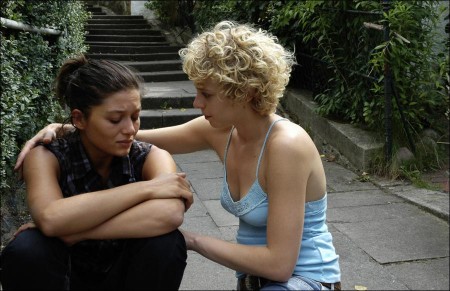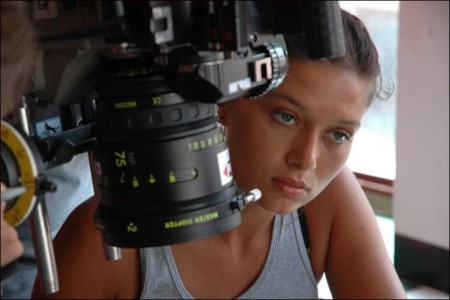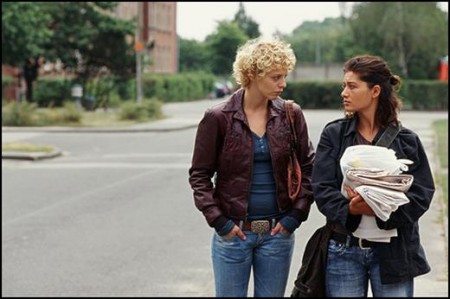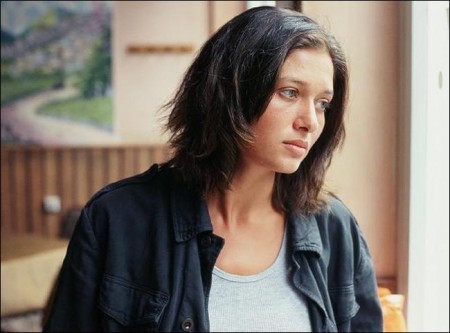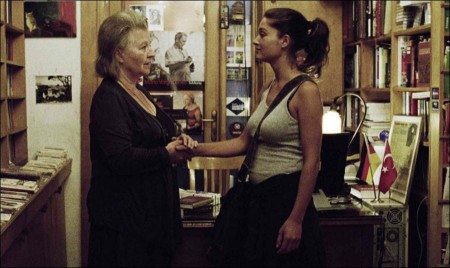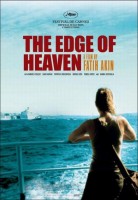Six people, six biographies, six lives are fatefully intertwined, taking them on a perilous journey to their own true selves, without the two sets of protagonists ever meeting. It is only the death of one figure from each strand that brings their fates together, inescapably linked from the very beginning.
Starring Nurgül Yesilçay, Hanna Schygulla, Baki Davrak, Patrycia Ziolkowska, Nursel Köse and Tunçel Kurtiz. Linked through encounters, relationships and even death, the fragile lives of six people connect on emotional voyages toward forgiveness and reconciliation in Germany and Turkey …
Nejat (Baki Davrak) seems disapproving about his widower father Ali’s (Tuncel Kurtiz) choice of prostitute Yeter (Nursel Köse) for a live-in girlfriend. But he grows fond of her when he discovers she sends money home to Turkey for her daughter’s university studies. Yeter’s sudden death distances father and son. Nejat travels to Istanbul to search for Yeter’s daughter Ayten (Nurgül Yesilçay).
Political activist Ayten has fled the Turkish police and is already in Germany. She is befriended by a young woman, Lotte (Patrycia Ziolkowska), who invites rebellious Ayten to stay in her home, a gesture not particularly pleasing to her conservative mother Susanne (Hanna Schygulla). When Ayten is arrested and her asylum plea is denied, she is deported and imprisoned in Turkey. Lotte travels to Turkey, where she gets caught up in the seemingly hopeless situation of freeing Ayten.
Review
The point at which a good director crosses the career bridge to become a substantial international talent is vividly clear in “The Edge of Heaven,” an utterly assured, profoundly moving fifth feature by Fatih Akin. Superbly cast drama, in which the lives and emotional arcs of six people — four Turks and two Germans — criss-cross through love and tragedy takes the German-born Turkish writer-director’s ongoing interest in two seemingly divergent cultures to a humanist level that’s way beyond the grungy romanticism of his 2003 “Head-On” or the dreamy dramedy of “In July” (2000). Robust upscale biz looks a given.
Pic opens and closes in Turkey during a bayram, the word for a festival or holiday regardless of national or religious differences. First seen tooling around the Black Sea coast, Hamburg U. prof Nejat (Baki Davrak) is next seen arriving in nearby Bremen, where his father, sprightly septuagenarian Ali (Tuncel Kurtiz), still visits hookers as a cure for his loneliness.
Happening upon a no-nonsense Turkish prostie, Yeter (Nursel Kose), he proposes she moves in with him if he matches her hooking income. Under pressure to quit her job by two fundamentalist Turkish thugs, Yeter agrees.
Turns out that, back in Turkey, Yeter has a 27-year-old daughter, Ayten (Nurgul Yesilcay), who thinks her mom works in a shoe shop. When Ali is hospitalized after a heart attack, Yeter forms a close relationship with the quiet Nejat, who accepts his father’s patriarchal lifestyle.
However, viewers have already been warned, in pic’s opening title (“Yeter’s Death”), that tragedy is waiting round the corner. Sure enough, Yeter is accidentally killed by Ali in an argument. As Ali is incarcerated in a German jail and Yeter’s body is shipped home, story shifts to Istanbul, where Nejat has bought a German-language backstreets bookshop. Between times, he’s searching for Ayten, to finance her education as a form of reparation.
As another audience warning (“Lotte’s Death”) appears on screen 40 minutes in, we meet Ayten, a political activist using the alias Gul Korkmaz who’s on the run from the authorities. Fleeing to Germany, she ends up penniless in Hamburg where she’s befriended by college student Lotte, daughter of comfy, middle-class Susanne (vet Hanna Schygulla). Lotte and Ayten become lovers, setting in motion a complex series of criss-crossing events that changes the lives of the survivors for ever as the story shifts back to Turkey.
Pic has a lean, almost procedural style, in which every scene and line of dialogue counts. Akin doesn’t try to hide the plot’s coincidences or Swiss watch-like precision, which is given human resonance by the flawless playing of the six leads. Only one scene, a political face-off by Ayten and Susanne, rings awkwardly.
By the time the second seg segues into the final one (film’s German title, “From the Other Side”), helmer’s long-burn approach packs a considerable emotional wallop in a quiet, inclusive way.
Veteran Turkish actor Kurtiz, who’s almost a national monument back home, dominates the early going with his frisky but deeply traditional Ali. Distaffers take over the running in the second half, with the utterly convincing Yesilcay (so good in the very different role of a quiet Moslem bride in recent Turkish pic “Adam & the Devil”) and Ziolkowska (from Akin’s “Solino”) as the lesbian lovers. Schygulla’s low-key perf grows more slowly, bringing a reconciliatory glow to the final reels.
Akin’s cultural ease with both countries shows in the shooting, spread between Bremen, Hamburg, Istanbul and Trabzon. Good-looking but never gratuitously glossy lensing by Rainer Klausmann (“Solino,” “Head-On,” “Downfall”) is an extra plus, as is the liberating score by Shantel (aka Stefan Hantel).
Production notes provided by Anka Film, Corazon International.
The Edge of Heaven
Starring: Nurgül Yesilçay, Baki Davrak, Tuncel Kurtiz, Hanna Schygulla, Patrycia Ziolkowska, Nursel Köse
Directed by: Fatih Akin
Screenplay by: Fatih Akin
Release: September 27, 2007 (Germany), Oct. 26, 2007 (Turkey)
MPAA Rating: None.
Studio: Anka Film, Corazon International
Box Office Totals
Domestic: $738,623 (4.3%)
Foreign: $16,620,457 (95.7%)
Total: $17,359,080 (Worldwide)
